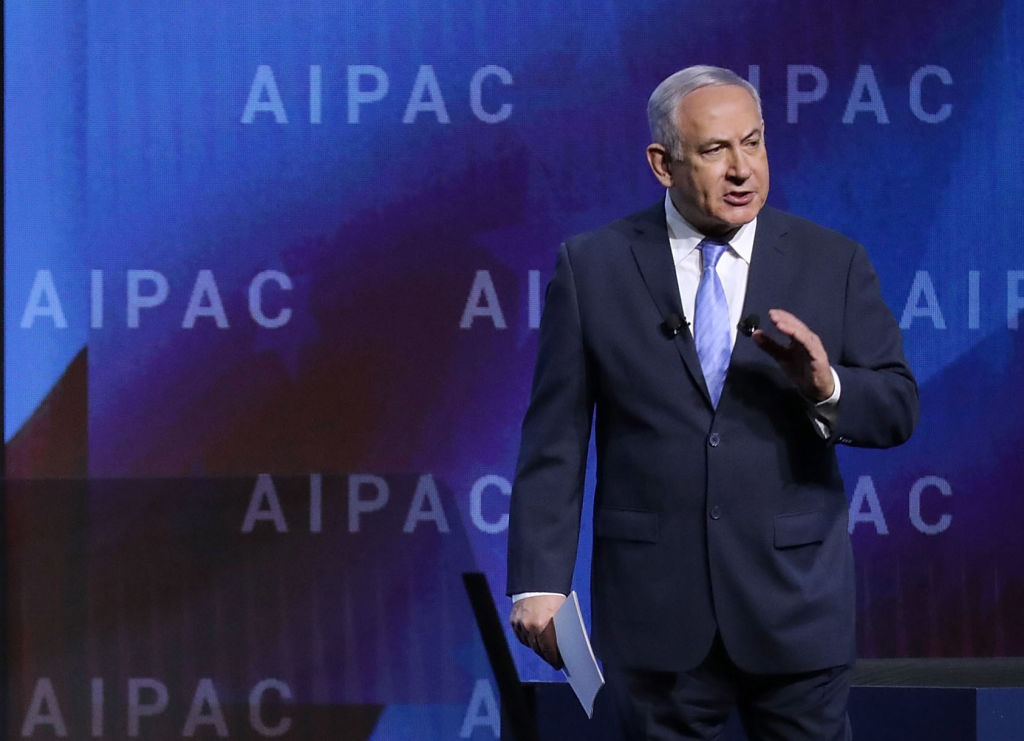AIPAC-Backed Lawmakers Are Pushing AI Funding for Israel
Congressional Republicans have delivered on the pro-Israel organization AIPAC’s wish list in the latest military spending bill, including tens of millions of dollars a year for the Israeli military to develop AI technologies.

Israeli prime minister Benjamin Netanyahu addresses AIPAC’s annual policy conference on March 6, 2018, in Washington, DC. (Chip Somodevilla / Getty Images)
A wish list of legislative items prioritized by the pro-Israel lobbying powerhouse American Israel Public Affairs Committee (AIPAC) earlier this year has been nearly entirely fulfilled by the new National Defense Authorization Act (NDAA), including tens of millions of dollars a year for the Israeli military to develop artificial intelligence technologies.
Congressional Republicans have, as usual, turned the must-pass annual defense policy legislation into a defense industry bonanza. The latest version of the NDAA that advanced in the House last week authorizes $848 billion in spending for the US military, much of which will be funneled (with additional revenue from Donald Trump’s megabill) straight to private defense contractors like Boeing and Lockheed Martin.
Israel, unsurprisingly, is another major winner, thanks in part to the lobbying forces of AIPAC in Washington, DC. The group spent more than $100 million on the 2024 federal elections, setting a campaign spending record. Nearly two-thirds of Congress have accepted AIPAC money, ensuring a united bipartisan front in support of Israel even as the country wages what many experts have definitively concluded is a genocide in Gaza.
Now AIPAC-funded lawmakers appear to be eagerly rubber-stamping the organization’s defense requests, which will funnel more money to the Israel Defense Forces — which has received more than $18 billion in US financial support since October 7.
Lawmakers, with AIPAC’s backing, introduced legislation, the “United States-Israel Defense Partnership Act of 2025,” in February to authorize hundreds of millions more in spending on various partnerships between the Israeli and US militaries. The organization spent the spring drumming up support for the bill among lawmakers.
The bill’s highlights include $150 million for a new joint technology program between the United States and Israel to counter drone weapons; it also entails extending the so-called “Future of Warfare” program for another five years, at $50 million annually, to develop “emerging technologies” like artificial intelligence. Last year, an investigation by the Israeli magazine +972 revealed that the Israeli military was using AI to generate bombing targets, contributing to the immense civilian death toll of the war in Gaza.
Another provision would direct money toward development of “anti-tunneling” technology, the sensors and weapons sometimes referred to as Israel’s “underground Iron Dome.”
Most of these key defense provisions that AIPAC supported in a policy brief this year and lobbied for throughout the spring are now included in both the House and Senate draft versions of the NDAA, having survived committee markups. AIPAC has spent nearly $1 million lobbying on the defense bill, among other legislative priorities, in the first quarter of 2025.
The lead sponsors of the US-Israel Defense Partnership Act have received millions from AIPAC and its affiliated network of pro-Israel donors: Rep. Josh Gottheimer (D-NJ), has accepted more than $1.5 million from AIPAC and its network of donors over his congressional career, while Rep. Donald Norcross (D-NJ), counts AIPAC as his top campaign donor.
AIPAC’s wins in the NDAA come alongside the recent Department of Defense appropriations bill, which passed this week. US Rep. Marjorie Taylor Greene (R-GA) introduced an amendment to cut $500 million in US funding for Israel’s missile defense systems. The amendment was shot down 6-422.